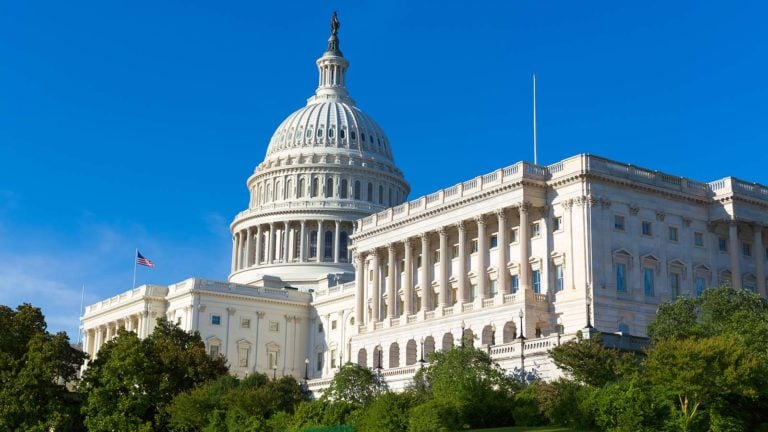The Inflation Reduction Act of 2022 has been the talk of Washington for weeks. It appears the seemingly never-ending rounds of political negotiations haven’t been for naught, however. The bill managed to pass a polarized Senate 51-50, requiring Vice President Kamala Harris’s tie-breaking vote. The bill will face a likely warm reception from the House of Representatives before going to President Joe Biden to become law.
Should it pass, the bill would be one of the most progressive pieces of legislation in both U.S. and world history. Indeed, Biden’s landmark initiative touches on sectors far and wide, and may yield surprising effects both on Wall Street and your portfolio.
So, what exactly would the law do?
Inflation Reduction Act Set to Make Waves Across Medical, Environmental Sectors
As many investors have already noticed, the bill would greatly hasten the transition toward clean energy by way of a $370 billion investment in energy security and climate change. The bill also touches on hot items like prescription drug pricing reform, a 15% corporate minimum tax, and an extension of the Affordable Care Act. The bill would lower the deficit by $300 billion, which, according to the Biden administration, would help ease inflation.
Starting at the top, the green investment would lower carbon emissions by 40% by 2030, largely through expanding wind and solar energy systems. It would also further promote electric vehicle adoption by expanding tax benefits.
Medicare recipients have also closely watched the legislation’s evolution, and for good reason. The bill would allow Medicare to negotiate drug prices for the first time ever. This would save hundreds of millions in prescription drug costs, lowering prices for patients and taxpayers.
The bill is largely funded via taxes on corporations. The bill currently mandates a 1% tax on all corporate share buybacks, and a 15% minimum income tax on companies earnings more than $1 billion in revenue. It also closes a number of tax loopholes used by corporations and wealthy Americans, requiring the now-infamous $80 billion allocation for the Internal Revenue Service, which would go toward the hiring of 87,000 new IRS agents.
What would these sweeping changes mean for investors?
Investors Poised for Strong EV Gains
The legislation has far-reaching affects on the investment world. The winners of the bill are relatively straightforward: EV and renewable energy companies are set to reap major benefits. The $369 billion in clean energy would go toward solar panels, wind turbines, and tax benefits to those selling and buying EVs. Indeed, currently automakers are eligible for $7,500 in tax credits per vehicle, but only up to the first 200,000 vehicles sold. The law would increase this limit, as well as offer consumers $4,000 in credits for pre-owned EVs.
When you add in all the tax benefits and rebates in the Inflation Reduction Act, even a low- or medium-income household could receive incentives up to $28,500 to buy electric vehicles, or even appliances like rooftop solar panels.
For current and future investors in renewable energy and EVs, this is a very strong sign. It seems the market is even already beginning to price in this green new reality. Companies like Volta (NASDAQ:VLTA), which installs EV charging stations, alongside well-known EV makers like Tesla (NASDAQ:TSLA) and Lucid (NASDAQ:LCID), all made strong gains to start the week.
New Corporate Tax Methodology Appears Unkind to Big Businesses
Large corporations have long been proponents of stock buybacks when times are good. Over the past year, S&P 500 companies have purchased more than $1 trillion in buybacks. Stock buybacks often raise the value of shares as a benefit to the company and its shareholders. As such, legislation that discourages share repurchases could result in weaker stock price growth than companies would’ve otherwise experienced. Companies like Apple (NASDAQ:AAPL) have long been proponents of share buybacks; AAPL’s price growth over its lifetime is partially a testament to that. While a 1% buyback fee won’t fall too hard on the multibillion-dollar organizations, it will disincentivize companies to act on their fiduciary responsibility to shareholders.
Sonia Joao, chief operating officer at Robertson Wealth Management, commented on the effect the stock buyback tax may have on corporations.
We find the potential tax on share buybacks to be particularly interesting. Share buybacks have been a popular way for American companies, and particularly tech firms, to reward their shareholders. This may incentivize them to spend less on payouts and more on dividends or debt reduction.
The revamped corporate tax structure also seeks to close a number of loopholes many companies have long exploited. A number of the largest companies have avoided billions in taxes year after year. This legislation would somewhat put an end to the tax avoidance phenomenon. For fans of Amazon (NASDAQ:AMZN) stock, this means your favorite e-commerce super giant may have to pay more than the 6.1% effective income tax it paid last year.
On the date of publication, Shrey Dua did not hold (either directly or indirectly) any positions in the securities mentioned in this article. The opinions expressed in this article are those of the writer, subject to the InvestorPlace.com Publishing Guidelines.

